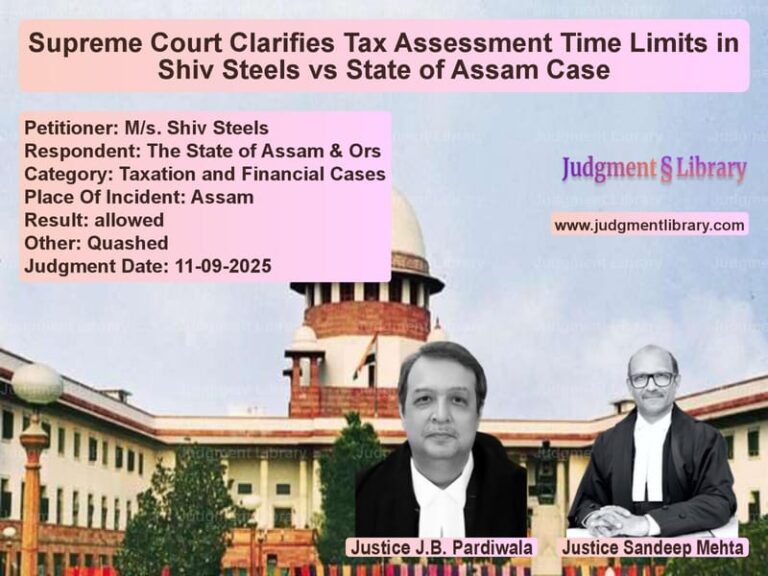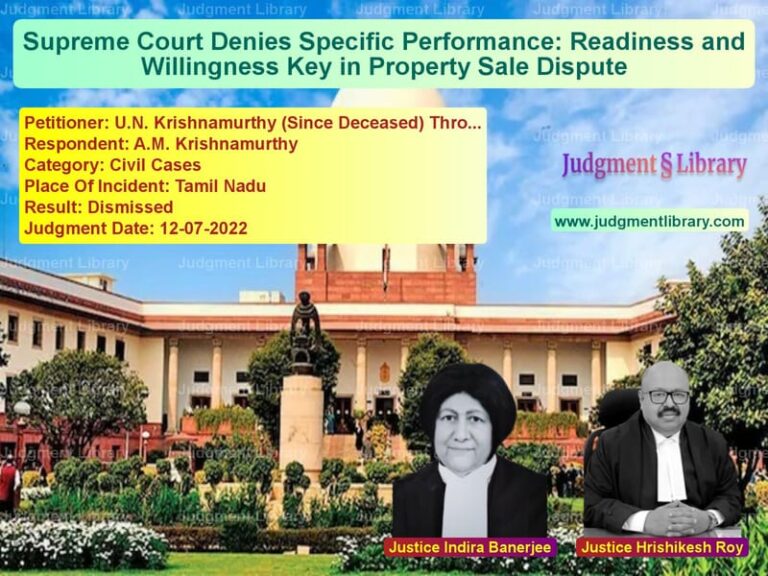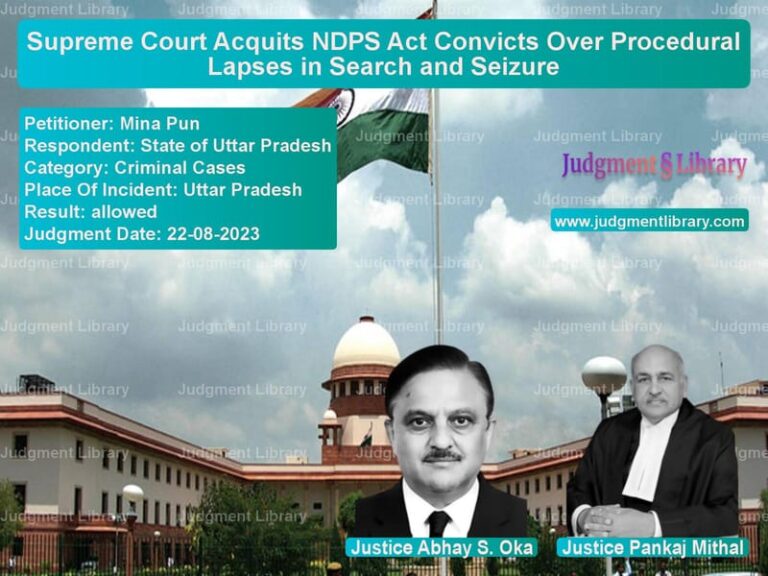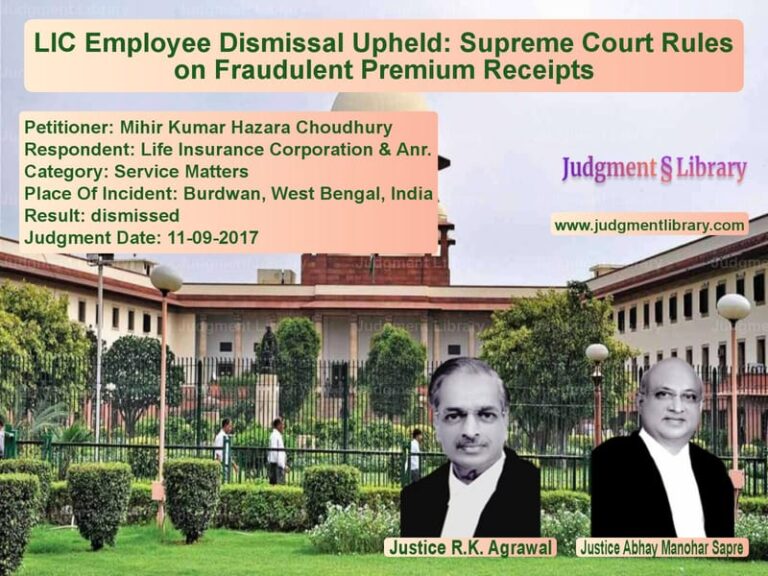Legal Battle Over Framing of Charges: Supreme Court Restores Trial in Murder Case
The case of Bhawna Bai v. Ghanshyam and Others is a significant judgment in Indian criminal law, dealing with the procedural aspects of framing charges and judicial review of such decisions. This case highlights the circumstances under which higher courts can interfere with lower court decisions, particularly when a trial court frames charges based on prima facie evidence.
The appeal arose from a decision of the High Court of Madhya Pradesh, which had quashed the charges framed by the trial court against the accused persons under Section 302 IPC. The Supreme Court, in its detailed ruling, reinstated the trial, emphasizing that at the stage of framing charges, the standard of proof is not beyond a reasonable doubt but rather the existence of sufficient material to proceed with the trial.
Background of the Case
On December 24, 2015, Gopal Saran, the husband of the appellant, Bhawna Bai, went to plough a field in the evening but never returned home. When his wife attempted to contact him, she received no response. The next morning, the deceased was found in a water tank on the property of one of the accused. The appellant alleged that she was prevented from approaching her husband’s body and that the post-mortem was conducted without her consent.
Despite her efforts, no FIR was initially registered by the police. The appellant had to approach the Additional Chief Judicial Magistrate (ACJM), who directed the police to register an FIR under Section 302 IPC. The trial court framed charges, but the High Court quashed them, leading to this appeal before the Supreme Court.
Petitioner’s Arguments
The petitioner, represented by her counsel, argued that there were substantial circumstances pointing to the guilt of the accused:
- The deceased was last seen in the company of the accused.
- The accused did not report the discovery of the body to the police.
- The personal belongings of the deceased were found with the accused.
- The accused had prior enmity with the deceased.
The petitioner contended that the trial court, after examining the material evidence, found enough grounds to frame charges and that the High Court had wrongly intervened at the preliminary stage of the trial.
Respondent’s Arguments
The respondents, on the other hand, argued that there was no prima facie case against them. They contended:
- The allegations in the charge sheet did not establish their involvement beyond speculation.
- The trial court did not apply its judicial mind before framing charges.
- The High Court rightly intervened to prevent a baseless prosecution.
Supreme Court’s Analysis
The Supreme Court carefully examined the legal principles governing the framing of charges under Sections 227 and 228 CrPC. It reiterated that at the stage of framing charges, the court does not conduct a mini-trial. The Court noted:
“At the stage of framing the charge, the court is not required to meticulously examine whether the case will ultimately result in conviction.”
The Court referred to precedents, including Amit Kapoor v. Ramesh Chander and State of Bihar v. Ramesh Singh, where it was held that strong suspicion is sufficient to frame charges.
Legal Precedents Cited
The Court relied on several judgments that clarify the scope of judicial review at the stage of framing charges:
- In Amit Kapoor v. Ramesh Chander, the Court held that at the stage of framing charges, a strong suspicion of guilt is sufficient.
- In State of Bihar v. Ramesh Singh, it was ruled that the final test of guilt is not to be applied at this stage.
- The Court also referred to Dinesh Tiwari v. State of U.P., which held that detailed reasoning is not required while framing charges.
Final Judgment
The Supreme Court set aside the High Court’s order and reinstated the charges framed by the trial court. The judgment underscored the limited scope of interference by higher courts at the stage of framing charges.
Conclusion
This judgment reaffirms the settled principle that courts should be cautious in quashing charges at the initial stage. It ensures that accused persons do not escape trial merely due to procedural technicalities. The ruling serves as a vital precedent in upholding the sanctity of criminal trials while safeguarding the rights of the accused.
Petitioner Name: Bhawna Bai.Respondent Name: Ghanshyam and Others.Judgment By: Justice R. Banumathi, Justice A.S. Bopanna, Justice Hrishikesh Roy.Place Of Incident: Madhya Pradesh.Judgment Date: 03-12-2019.
Don’t miss out on the full details! Download the complete judgment in PDF format below and gain valuable insights instantly!
Download Judgment: Bhawna Bai vs Ghanshyam and Others Supreme Court of India Judgment Dated 03-12-2019.pdf
Direct Downlaod Judgment: Direct downlaod this Judgment
See all petitions in Bail and Anticipatory Bail
See all petitions in Attempt to Murder Cases
See all petitions in Fraud and Forgery
See all petitions in Judgment by R. Banumathi
See all petitions in Judgment by A. S. Bopanna
See all petitions in Judgment by Hrishikesh Roy
See all petitions in allowed
See all petitions in supreme court of India judgments December 2019
See all petitions in 2019 judgments
See all posts in Criminal Cases Category
See all allowed petitions in Criminal Cases Category
See all Dismissed petitions in Criminal Cases Category
See all partially allowed petitions in Criminal Cases Category







